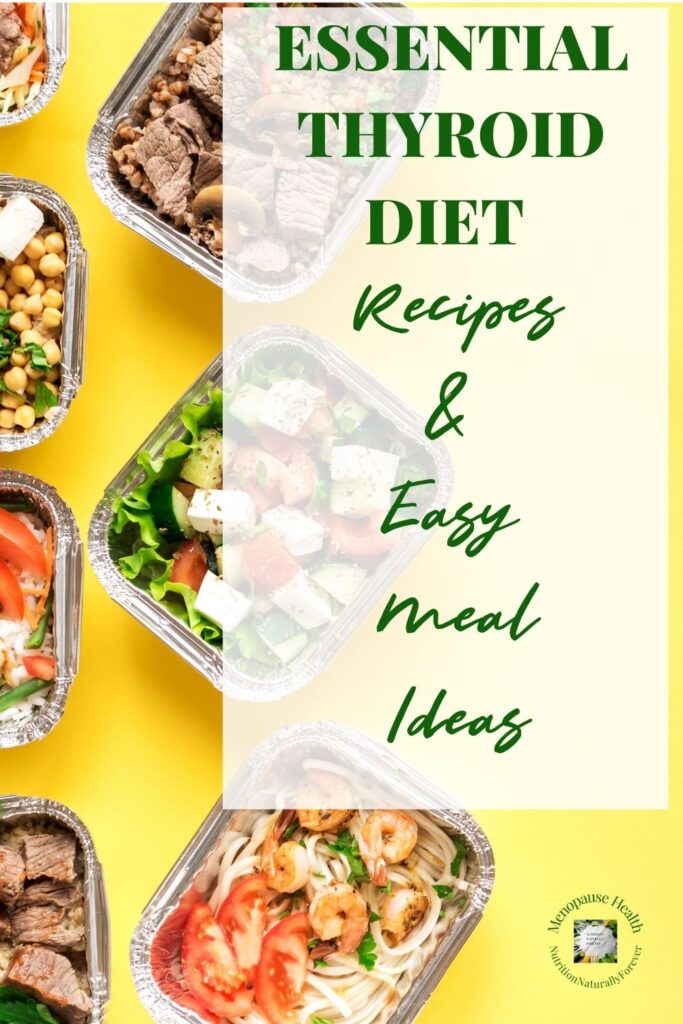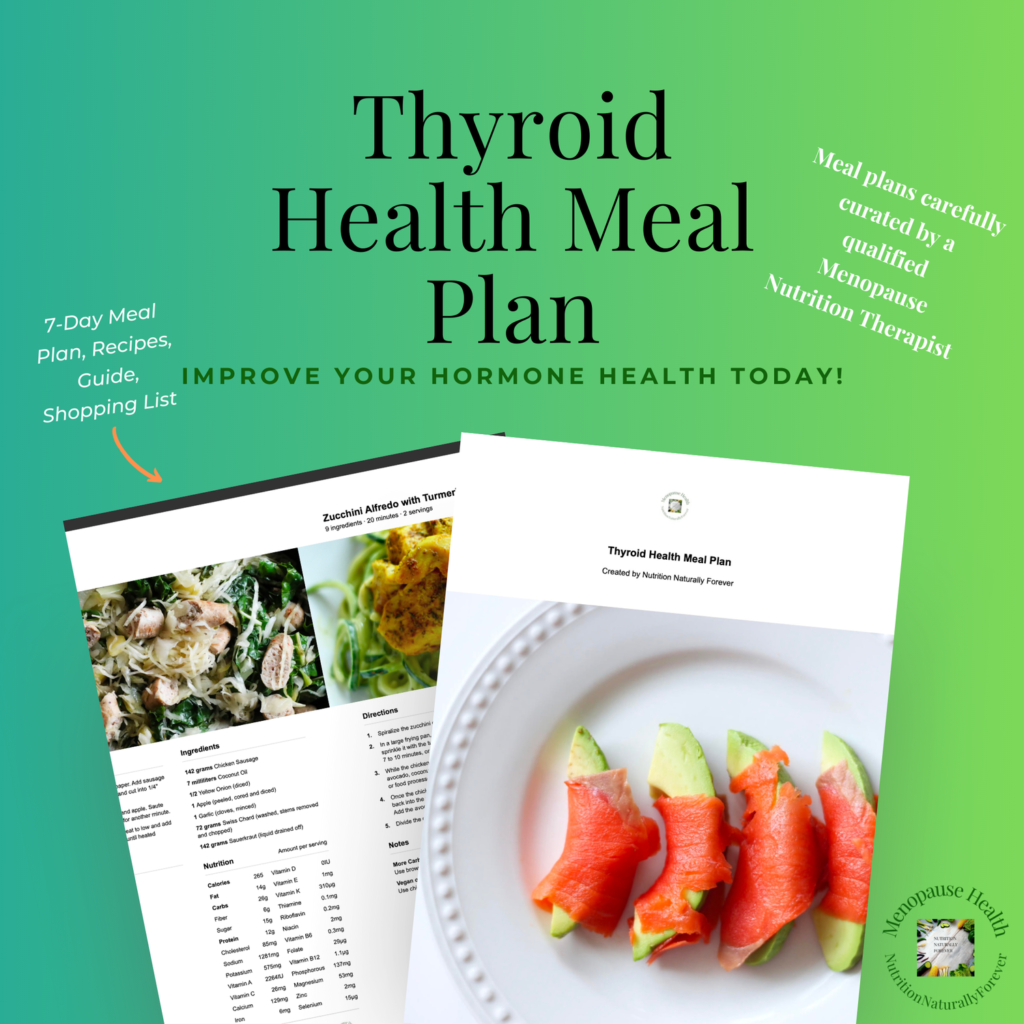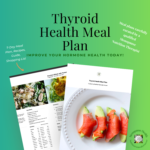
Essential Thyroid Diet Recipes & Easy Meal Ideas.
Navigating menopause can be a challenging and deeply uncertain time as you navigate the ups and downs of the hormone roller coaster.
Menopause is a time of significant change for women, and many of the symptoms we associate with this life stage, such as fatigue, weight gain, brain fog, and mood swings, can feel overwhelming.
However, what many women don’t realise is that these symptoms may not just be due to hormonal shifts alone, in fact, underlying thyroid issues could be contributing to these challenges, often complicating the menopause experience.
Your thyroid, a small butterfly-shaped gland located at the base of your neck, plays a critical role in regulating metabolism, energy production, and hormone balance.
During menopause, the delicate balance of estrogen, progesterone, and thyroid hormones is disrupted, making it more difficult for the body to maintain optimal function.
When thyroid health is compromised, it can worsen common menopause symptoms, leaving women feeling even more drained and frustrated.
The good news is that supporting your thyroid through a nutrient-dense, whole-foods-based diet can help ease menopause symptoms and restore balance to your body.
In this post, we’ll explore how real food and holistic practices can support thyroid health during menopause, and why focusing on the quality of what you eat is more important than ever.
Let’s dive into how you can nourish your thyroid and your body during menopause and how the right foods can make all the difference.
How the Thyroid Impacts Menopause Symptoms
The thyroid is a small but mighty gland, and its influence extends far beyond metabolism.
It plays a vital role in regulating your body’s energy, temperature, mood, and many other essential functions.
When your thyroid isn’t functioning properly, it can significantly affect how you feel.
During menopause, women experience fluctuating estrogen and progesterone levels. These hormonal changes can lead to various symptoms, such as hot flushes, night sweats, heavy or prolonged periods and mood swings to name but a few.
However, many women don’t realise that their thyroid, which regulates metabolism and energy production, is often impacted as well.
Hypothyroidism (an underactive thyroid) is a condition that can develop or worsen during menopause, and its symptoms often overlap with common menopause complaints.
If your thyroid isn’t producing enough thyroid hormones (like T3 and T4), your metabolism can slow down, making it harder for your body to maintain a healthy weight and energy levels.
Some of the most common symptoms of hypothyroidism include:
- Fatigue: Feeling consistently tired, even after a full night’s rest.
- Weight Gain: Unexplained weight gain or difficulty with weight loss despite eating well and exercising.
- Constipation: Difficulty with regular bowel movements, often feeling bloated or uncomfortable.
- Dry Skin and Hair: Thinning hair, brittle nails, and dry, flaky skin.
- Cold Sensitivity: Constantly feeling cold, even in warm environments.
- Brain Fog: Trouble concentrating, forgetfulness, and a general sense of mental sluggishness.
- Mood Swings: Increased irritability, sadness, or feelings of depression.
These symptoms are frustrating on their own, but when combined with the changes of menopause, they can be even more overwhelming.
Unfortunately, the symptoms of thyroid dysfunction are often mistaken for the typical signs of menopause, which can lead to delays in diagnosis and treatment.
It’s important to recognise that hypothyroidism can contribute to the severity of menopause symptoms, making it even harder for women to manage their health during this time.
By understanding the link between thyroid gland health and menopause, you can take the necessary steps to support your thyroid function and reduce symptoms.
If you missed it, check out my previous blog post where I dive deeper into how hypothyroidism and menopause are connected, and how addressing thyroid health can help you better navigate the challenges of this life stage.
The Role of Real, Nutrient-Dense Food in Thyroid Health
When it comes to supporting thyroid function during menopause, what you eat matters more than ever.
A nutrient-dense, whole-foods-based diet such as a paleo diet without unnecessary dietary supplements is crucial for keeping your thyroid healthy and your metabolism optimal.
Many women don’t realise that the foods they eat—or more importantly, the foods they don’t eat—can have a significant impact on thyroid health, especially during menopause.
The thyroid relies on specific vitamins and minerals to produce the hormones your body needs to function. Without these key nutrients, thyroid function can become sluggish, making it harder to maintain energy, metabolism, and hormonal balance.
By prioritising real, whole foods that are rich in these essential nutrients, you can help nourish and support your thyroid naturally.
Certain nutrients play an especially important role in thyroid health.
Let’s take a look at the ones you should focus on when planning your meals:
- Iodine: Iodine is a crucial element for thyroid hormone production. An iodine deficiency can lead to an underactive thyroid (hypothyroidism). Good food sources include seaweed, fish, dairy, and eggs.
- Selenium: This mineral helps the thyroid convert T4 into the more active T3 hormone, which is essential for metabolism and energy levels. Selenium-rich foods include Brazil nuts, sunflower seeds, and seafood.
- Zinc: Zinc supports the synthesis of thyroid hormones and helps regulate the immune system. You can find zinc in foods like shellfish, beef, pumpkin seeds, and lentils.
- Vitamin D: Vitamin D helps balance thyroid function, and deficiency can worsen hypothyroid symptoms. Fatty fish, fortified dairy products, and sunlight are natural sources of vitamin D.
- Omega-3 Fatty Acids: These healthy fats help reduce inflammation, a key factor in thyroid and overall hormone health. Omega-3s can be found in fatty fish like salmon, walnuts, flaxseeds, and chia seeds.
- Tyrosine: Tyrosine is an amino acid that is a building block for thyroid hormone production. Sources of tyrosine include turkey, chicken, soy products, and dairy.
By ensuring that you’re getting enough of these nutrients, you can support optimal thyroid function, improve energy levels, and ease many menopause-related symptoms.
Just as there are foods that can support thyroid health, there are also foods that can harm it.
In today’s food system, many products marketed as “healthy” or “diet-friendly” are packed with harmful ingredients that can disrupt thyroid function and overall health.
These ingredients can worsen inflammation, increase hormonal imbalances, and undermine your body’s ability to function optimally.
- Seed Oils: Vegetable and seed oils such as soybean, sunflower, and canola oil (rapeseed) are highly processed and rich in omega-6 fatty acids, which cause inflammation. Chronic inflammation can interfere with thyroid hormone production, making it harder to manage your metabolism. Read more about Toxic Seed Oils in this post.
- “Natural Ingredients”: Just because something is labelled as “natural” doesn’t mean it’s good for you. Many foods labelled as “natural” contain hidden chemicals or are highly processed. Always read labels carefully and opt for whole, non-ultra-processed foods.
- Protein Bars and Shakes: Many protein bars and shakes that are marketed as health foods are packed with artificial ingredients, added sugars, and preservatives. These foods might give a quick energy boost but can have long-term negative effects on your thyroid and overall health.
Instead of reaching for convenience foods or low-calorie products, it’s best to focus on nutrient-dense whole foods. These include fresh fruits, vegetables, high-quality proteins, healthy fats, and complex carbohydrates, all of which will provide your thyroid with the building blocks it needs to function properly.
Incorporating a variety of whole foods into your diet will help ensure that your thyroid is supported with the nutrients it requires to produce hormones and maintain balance during menopause.
Menopause And Malnutrition
For years, many of us have turned to low-calorie, low-fat, or other restrictive diets with fewer calories than the body requires to manage weight and health.
While these diets may have worked temporarily, they often leave us nutrient-deficient, as they focus more on calorie restriction than on the quality of the foods we consume.
Over time, this approach can harm our thyroid and metabolism.
For women with hypothyroidism or sluggish thyroid function, eating enough high-quality foods is essential for getting the nutrients needed to support hormone production and energy levels.
If you’re not getting enough of the right nutrients—like iodine, selenium, zinc, and omega-3 fatty acids—your thyroid may struggle to function properly, and your metabolism can slow even further.
This can lead to unwanted weight gain, fatigue, and other symptoms.
The key to finding your balance is to focus on eating more of the right foods, not less.
What is a healthy diet?
With all the conflicting advice out there—don’t eat fruit, eat fruit; don’t eat oats, eat oats—it’s easy to fall into the trap of sticking with what you know, even if it’s not the best for your health.
However, the best way to achieve your ideal body weight and create hormone harmony is by prioritising nutrient-dense meals rather than focusing on specific foods.
Focus on a wide variety of whole foods and simple ingredients that will be rich in vitamins, minerals, healthy fats (like coconut oil, olive oil, and real butter), and quality proteins.
At the same time, it’s essential to avoid ultra-processed junk foods and ingredients, such as seed oils, which can disrupt your thyroid and overall health.
By choosing whole, real foods, you give your thyroid and body the tools they need to restore balance and function optimally, leading to better energy levels, weight management, and overall well-being.
Learn More About Your Body
Now that you understand how thyroid problems and menopause are interconnected, it’s time to take action and start listening to your body.
Your body is constantly communicating with you, and by paying attention to how it responds to different foods, lifestyle changes, and stress levels, you can gain valuable insights into what your thyroid needs to function optimally.
Track Your Body’s Responses:
One of the best ways to start is by tracking how your body reacts to certain foods and lifestyle habits.
Consider keeping a simple journal or using an app to record:
- Energy levels throughout the day.
- Symptoms, such as fatigue, mood swings, skin changes, or hair thinning.
- Food intake and how you feel after eating (e.g., bloated, energised, sluggish).
- Exercise and stress levels to see how physical activity and stress reduction impact your thyroid and overall health.
- Menstrual/Moon Cycle women are cyclical beings and even if you no longer have a regular bleed you will still experience cyclical hormone changes that will be part of the bigger picture of your overall well-being.
Observing patterns over time, you can begin to understand which foods support your thyroid and which may be contributing to sluggishness or other symptoms.
This knowledge empowers you to make more informed decisions about your diet and lifestyle.
Deepen Your Understanding with Structured Support:
If you want to take this journey further and receive structured support tailored to managing thyroid health during menopause, I invite you to explore my Meal Planner for Thyroid Health.
This is a comprehensive guide to help you plan balanced, thyroid-supporting meals with nutrient-dense foods.
This meal plan offers a structured approach to making sustainable changes in your diet and lifestyle that promote long-term thyroid health.
Get More Support: Download My Free eBook or Join my Menopause Workshop
To further support your journey, I also encourage you to download my free eBook, 5 Nutrients Your Body Needs to Thrive During Menopause, which dives deeper into the essential nutrients your body requires during this transformative time. This eBook is packed with actionable tips on how to incorporate these nutrients into your daily meals and optimise your thyroid health.
Additionally, you can sign up for my Empowered Menopause Workshop, where I guide you to create your menopause vision statement. If you don’t know where you are going, how are you going to get there?
This short workshop, supported by an accompanying workbook, guides you to dream about what you want your future and post-menopause years to look like.
Once you have this you can begin to make that dream a reality and I can show you how!
Healing Your Thyroid for a Healthier Future
As you’ve learned, taking care of your thyroid is essential for overall health, especially during menopause.
Prioritising nutrient-dense, whole foods and adopting a holistic approach to your diet and lifestyle can make a significant difference in how your body responds during this transformative time.
Your thyroid plays a crucial role in regulating your metabolism, energy levels, and mood so supporting it with the right nutrients is key to feeling your best.
Remember, it’s not about drastic changes or fad diets. It’s about making small, sustainable adjustments that fit into your life and empower you to feel nourished and balanced. By focusing on real, wholesome foods rich in iodine, selenium, zinc, omega-3 fatty acids, and other essential nutrients, you’re giving your thyroid the support it needs to thrive.
Start by incorporating simple meals and making mindful choices, and trust that each small step will bring you closer to your health goals.
Whether you choose to swap out processed foods for more whole, nutrient-dense options, or experiment with new ingredients that support thyroid function, these changes can help you feel more energised, balanced, and in control of your body.
Menopause is not the end of vitality—it’s the beginning of a new chapter.
When approached holistically, it’s a time of transformation, self-discovery, and empowerment.
You’ve got the knowledge now so take action and start prioritising your thyroid health today. You deserve to feel your best, and with the right support, you can make this chapter of your life one of growth, health, and lasting vitality.
Download Your Thyroid Health Meal Plan

Download your digital copy of this carefully curated 7-day Thyroid Health Meal Plan and start your pathway to optimal menopause health. Purchase HERE for £4.79.

